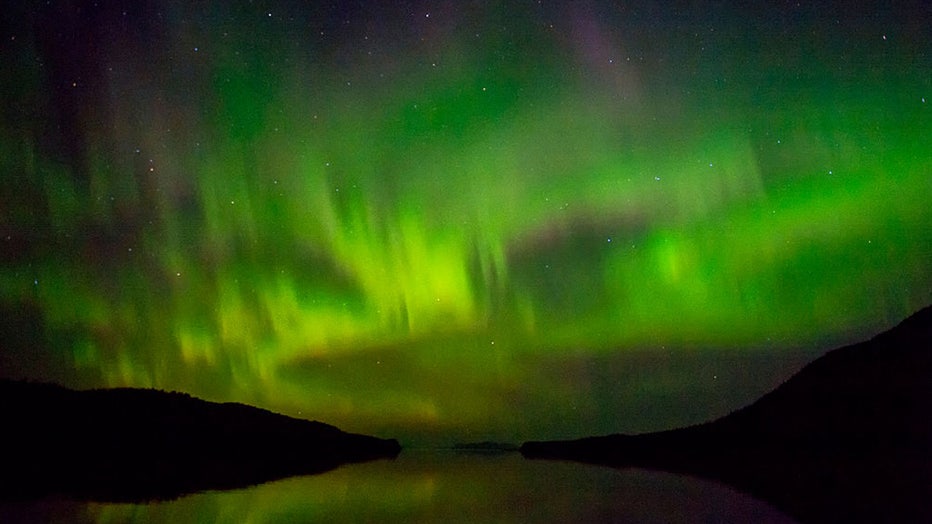How to record the Northern Lights above US skies in real-time

Spectacular Northern Lights display expected tonight
A Severe Geomagnetic Storm Watch raises the possibility of viewing the Northern Lights across the northern half of the U.S., and mostly clear skies are predicted for the Pacific Northwest.
As the allure of capturing the mesmerizing Northern Lights in the U.S. grows, many onlookers are wondering how they can catch the spectacle on video.
While photographs can freeze a moment in time, filming the Aurora Borealis requires navigating exposure settings to capture the fast-evolving colors and movements accurately.
If you're hoping to immortalize this weekend's Northern Lights event over U.S. skies, keep reading.
How to capture the Northern Lights on film
According to observations at the Aurora Borealis Observatory, capturing the phenomenon in real-time demands a "delicate balance of shutter speed, ISO and aperture settings." Unlike photography, where longer exposures allow for more light and detail, filming requires shutter speeds of at least 1/30 or 1/25 of a second to achieve smooth motion. The observatory notes that this limitation "restricts the amount of incoming light, necessitating adjustments to ISO settings, often exceeding 12800 to compensate for the reduced exposure."
Professionals who have filmed the Northern Lights at the Aurora Borealis Observatory say that "choosing the right equipment is crucial for successful real-time filming."
The observatory notes that cameras with high ISO capabilities, such as the Sony a7s series or the Canon R6, are recommended for their ability to handle extreme low-light conditions. Additionally, the observatory says "lenses with wide apertures, ideally f/1.4 or below, are preferred to maximize light intake."
Settings such as shutter speed, ISO and aperture must be carefully calibrated to achieve optimal results, according to the Aurora Borealis Observatory. While lower shutter speeds and higher ISO settings are necessary for proper exposure, selecting the appropriate picture profile (PP) can significantly impact the final footage. The observatory also notes that professionals often opt for Log gamma profiles to maximize dynamic range, although alternatives like Cine 2 gamma may offer better results straight out of the camera, particularly for minimizing noise.

The Northern Lights seen over Frederick Sound in Alaska. (Wolfgang Kaehler/LightRocket via Getty Images)
How to capture the Northern Lights on a smartphone
If you don't have a fancy camera, the blog, Hello Aurora says you can still "record impressive videos under the right conditions" using an iPhone or Android. To do so, Hello Aurora recommends the following steps:
Step 1: Open your camera app and switch to Photo mode
Hello Aurora says the aurora is more visible in your camera's Photo mode compared to Video mode due to the longer exposure time used when capturing a photo.
Step 2: Record your screen using the screen recording feature of your phone
Step 3: Edit
To get the best video possible, Hello Aurora recommends editing your recorded video by removing the initial segment where you activated the screen recording. Then, crop the screen as you like.
When using Photo mode, Hello Aurora says this "minimizes camera shake and makes sharper images" but does vary depending on your phone model and software version. If your phone's camera quality is not clear enough to see the Northern Lights, the blog recommends downloading an external app like NightCap, to help improve visibility.
If you're using an iPhone 11 Pro or newer, Visit Iceland recommends using Night mode, and says to "use it to adjust your exposure time (around 10-15 seconds) to capture the aurora's dance."
Here's to hoping you catch the elusive Green Lady dancing across the U.S. night skies this weekend.
MORE NEWS FROM FOX 13 SEATTLE
Flight delays expected during Pres. Biden's Sea-Tac arrival. Here's what to know
T-Mobile Park urges transit use amid President Biden's Seattle visit
Seattle's 520 bridge to close this weekend, plus more traffic woes with Biden's visit
Viral TikToks show students' names pronounced 'horribly' wrong at Philadelphia gr
Pike Brewinaduationg releases new lager to support WSU's Cougar Collective
To get the best local news, weather and sports in Seattle for free, sign up for the daily FOX 13 Seattle newsletter.

